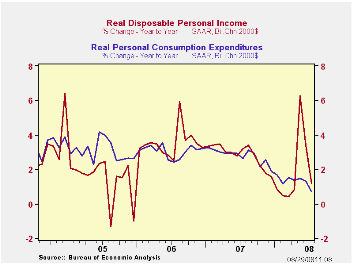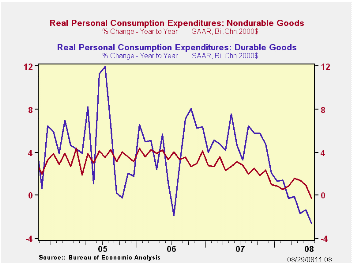 Global| Aug 29 2008
Global| Aug 29 2008U.S. Income Fell Without the Stimulus Checks
by:Tom Moeller
|in:Economy in Brief
Summary
Nominal personal income fell 0.7% in July after gains of 0.1% and 1.8% during the prior two months. Those increases were lifted by $90B from the government's tax rebate checks. The June drop in personal income exceeded Consensus [...]

Nominal personal income fell 0.7% in July after gains of 0.1% and 1.8% during the prior two months. Those increases were lifted by $90B from the government's tax rebate checks. The June drop in personal income exceeded Consensus expectations for a 0.2% decline.
Disposable personal income fell 1.1% last month following a 1.9% decline during June and a 5.7% jump during May. Net taxes increased 1.8% last month, due to the absence of rebates, after an 18.7% June jump.
Wage & salary income increased a modest 0.3% (4.1% y/y) after a 0.2% rise during June. These increases left the annualized three-month growth in wages low at 3.2% versus a 5.6% increase during 2007 and a 6.3% 2006 gain. Factory sector wages ticked up 0.1% (1.1% y/y) and three-month growth totaled 2.1%. Wages & salaries in the private service-providing industries increased 0.2% (4.3% y/y) while three-month growth amounted to 2.6% after last year's gain of 6.4%. Wages in the government sector were firm again and rose 0.4% (5.5% y/y) rise and three-month growth rose to 5.8%.
Interest income jumped 1.1% (-1.7% y/y) and made up the prior month's decline. Interest income rose 7.9% during all of 2007. Dividend income rose 0.6% (8.2% y/y) for the third consecutive month. That followed a 12.4% rise last year and a 21.7% gain during 2006.
The PCE chain price index was strong again and rose 0.6%, firm due to higher energy prices. The gain in the core PCE price index also remained firm with a 0.3% increase. That matched Consensus forecasts but three-month growth increased to 2.8%, the firmest growth rate since early 2006. Durable goods prices ticked up 0.1% (-1.0% y/y) for the second month. Last month's small increase was held back by a 0.2% decline in furniture prices (-4.4% y/y). Prices for nondurable goods, however, were quite firm and they posted 1.2% gain (8.2% y/y). Apparel prices also were firm and they rose 0.1% y/y after the 2.2% rate of deflation reached this past March. Services prices jumped 0.4% (3.8% y/y) led higher by a 4.1% (15.2% y/y) jump in electricity costs.
Personal consumption expenditures ticked up 0.2% after the 0.6% rise during June. Adjusted for price inflation, however, real spending fell another 0.4% after a 0.1% downtick during June. Three-month growth in real spending amounted to a negative 0.7% (AR) with real spending on motor vehicles down at a 25.2% rate. Furniture spending rose at a 6.0% rate during the last three months but spending on clothing fell at a 5.2% rate.
The personal savings rate halved to 1.2% from 2.5% in June and 4.9% in May.
The figures noted above are available in the Haver USECON and in the USNA databases.
| Disposition of Personal Income (%) | July | June | Y/Y | 2007 | 2006 | 2005 |
|---|---|---|---|---|---|---|
| Personal Income | -0.7 | 0.1 | 4.2 | 6.1 | 7.1 | 5.6 |
| Disposable Personal Income | -1.1 | -1.9 | 5.8 | 5.5 | 6.4 | 4.4 |
| Personal Consumption | 0.2 | 0.6 | 5.3 | 5.5 | 5.9 | 6.2 |
| Saving Rate | 1.2 | 2.5 | 0.3 (July '07) | 0.5 | 0.7 | 0.3 |
| PCE Chain Price Index | 0.6 | 0.7 | 4.5 | 2.6 | 2.8 | 2.9 |
| Less food & energy | 0.3 | 0.3 | 2.4 | 2.2 | 2.3 | 2.1 |
Tom Moeller
AuthorMore in Author Profile »Prior to joining Haver Analytics in 2000, Mr. Moeller worked as the Economist at Chancellor Capital Management from 1985 to 1999. There, he developed comprehensive economic forecasts and interpreted economic data for equity and fixed income portfolio managers. Also at Chancellor, Mr. Moeller worked as an equity analyst and was responsible for researching and rating companies in the economically sensitive automobile and housing industries for investment in Chancellor’s equity portfolio. Prior to joining Chancellor, Mr. Moeller was an Economist at Citibank from 1979 to 1984. He also analyzed pricing behavior in the metals industry for the Council on Wage and Price Stability in Washington, D.C. In 1999, Mr. Moeller received the award for most accurate forecast from the Forecasters' Club of New York. From 1990 to 1992 he was President of the New York Association for Business Economists. Mr. Moeller earned an M.B.A. in Finance from Fordham University, where he graduated in 1987. He holds a Bachelor of Arts in Economics from George Washington University.
More Economy in Brief
 Global| Feb 05 2026
Global| Feb 05 2026Charts of the Week: Balanced Policy, Resilient Data and AI Narratives
by:Andrew Cates






